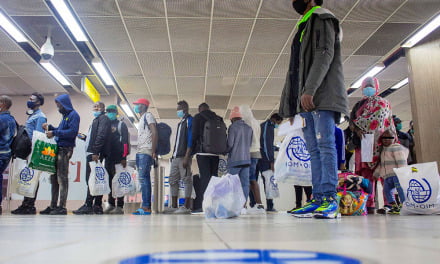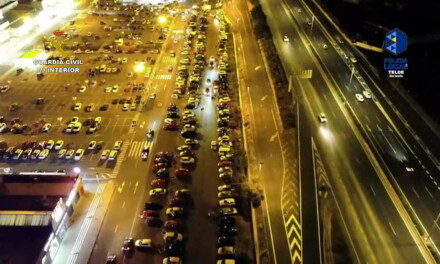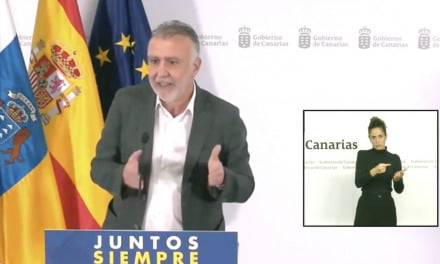The number of migrant arrivals to the Canary Islands has seen a sudden decrease in the first half of February, with just 155 people having arrived irregularly by boat, however overall numbers are up, with 1,008 having arrived in the last two weeks of January and 1,069 in the first two weeks. Are we on the verge of an even greater increase in migrant arrivals to The Canary Islands? If so, what’s the plan? Will we distinguish ourselves through our humanitarian response, or will we allow hatred and fear to begin to represent us while fruitlessly looking for someone else to blame? Isn’t it time we take responsibility for doing the right thing when faced with the immovable fact of thousands risking their lives based on false promises and faked hopes
Cover image: Bård Ove Myhr
The biweekly report issued on irregular migration and migrant arrivals, prepared by Spain’s Ministry of the Interior, indicates that the accumulated number of migrants arriving irregularly on the Canary Islands so far this year amounts to 2,232 people, compared to last year when by this time just 1,008 had arrived between January 1 and February 15, 2020.
The new data for the first fortnight of February represents a significant decrease, with respect to the previous fortnightly reports, which do however appear to be on a downward trend: 2,077 migrants arrived on the Canary Islands, this January and in December the total number was 3,457.
The 155 people who reached the Canarian archipelago’s coasts in the first half of February represent just over half the number of those who had arrived in the first half of February 2020, when 300 made it to our coastline. There could be many reasons for this, and we may not ever know just how many began the journey, never to be seen again. Statisticians are cautiously hopeful.
Migrant arrivals continue to fall nationally, but are up on The Canary Islands
So far this year, a total of 3,581 migrant arrivals have landed in Spain, either by sea or by land, compared to 3,954 during the same period last year, which represents an overall decrease of 9.4%.
The vast majority arrived by sea, 3,228, which is similar, if slightly more, than that of the first 45 days of 2020, when 3,209 people had arrived, so just 19 more this year by sea for the entire country.
While the Canary Islands continues to register an increase in arrivals for that period compared to 2020 (121.4% with 1,224 more people on 60 boats), irregular migrants arriving on the peninsula and the Balearic Islands have continued to significantly decrease.
Specifically, the Balearic archipelago and the coasts of the peninsula have registered 56.2% fewer migrants so far this year, with 954 arriving in 83 boats, compared to the 2,180 for the same period of 2020.
42 migrant arrivals came by sea to Ceuta, double the number for 2020, and none to Melilla. By land, these Spanish autonomous cities on the north coast of Morocco have counted 353 arrivals (195 to Ceuta and 158 to Melilla) between January 1 and February 15, compared to 745 over the same period in 2020.
We hope we are wrong. But hope is not a strategy. Who is it we plan to be?
The Spanish Government’s complete failure to understand the warnings, that had been repeated since at least the summer of 2019, could in part be due to their failure to understand how unusual the huge increases that were occurring in The Canary Islands really were.
Perhaps, due to a near 30% drop in total migration the ministers involved failed to appreciate the sudden growth in traffic heading for this archipelago. That coupled to the mass confusion caused by a rising global pandemic, surely did them no favours either.
That all said, they can expect no such excuses to be acceptable this year. Every indicator we have has, at least until this last fortnight, suggested a continued increase in expected migrant arrivals for the coming year. Though migrant arrivals into the entire Spanish territory are down, once again, overall, by a further 9.4%; maritime arrivals have risen slightly. The entirety of this increase appears to be rooted in what is occurring on the Atlantic coasts of Africa and traffic along The Canary Route, Europe’s most dangerous migratory pathway.
While maritime migration for Spain has dropped by more than 56%, the figures for The Canary Islands should be taken very seriously. We need much more effective policies to help us deal with what could be about to happen. Despite the sudden decrease in arrivals over the last two weeks, when we have also seen storms and bad conditions at sea, overall we are still experiencing an increasing trend when compared to this time last year, and the year before.
During the first three weeks of 2019 we received just 7 pateras carrying 66 individuals. By the first three weeks of 2020, the number of boats had increased by 400%, to 35 carrying a total of 1,008 migrant arrivals, an increase of 1,427.3%. This year the number of boats embarking on that journey within the first 45 days of 2021 has increased, overall, by a further 76.5% to total 60 vessels already arrived, carrying 2,232 souls, an accumulated increase of 121.4%. More than double the number last year already.
As coronavirus continues to be an obstacle to tourism and international travel, and as its effects on African economies begin to be understood, we are likely to see much larger numbers than we have seen before, and there seems to be not one thing we can do to change that, so we have to figure out how we will respond to the reality. If we are lucky, the downward trend will continue for now, but if the current numbers are anything to go by 2021 is looking a lot harder than perhaps anyone is really talking about yet.
So we now have to answer at least four very serious questions of the most pressing urgency:
- First, and foremost, what financial support and practical plans, in the short term, are already in place to help us cope here on the islands if these numbers continue to rise? It is pointless using words like “should”, we MUST know what it is we are planning to do faced with this reality.
- Second, what exactly is being done by Europe and the Government of Spain to help ensure that The Canary Islands is not falling prey to feelings of abandonment? Xenophobic rhetoric and hate speech has already risen its ugly head, making this region now fertile ground for feelings of insecurity and the predictable attentions of the thinly veiled would-be-fascist politics of hatred. The Canary Islands people need saving too. What are we teaching our children?
- Third, who are we here on The Canary Islands, who is it we want to be? Will we descend into continued frustrated denial, or will we accept that this is really happening and that we cannot hope to improve the situation through anger and blame? Faced with de facto increases in migrant arrivals, and the impossibility of policing our maritime borders, or the more than 7,000km of African coastline from which these people embark, even if we were to deploy the entire Spanish Armada, how are we as humans, and as communities, going to deal with the fact that there are potentially tens of thousands of individuals who, for at least as many different reasons, may well be planning to risk their lives to try to get to us, ostensibly to make better lives for themselves and their families, on the basis of false promises and totally faked images of what really awaits them, both on their journey and when they arrive. The fact is that more than 90% of them will, in the end, be sent back to where (we think) they came from. Who do we plan to be in the meantime?

 Fourth, and perhaps most profound: how do we propose to face the real issues that are causing this? The future for Africa does not lie in The Canary Islands, her future is in Africa; but we can help. Let’s be clear. Africa’s problems are as diverse as her peoples, from growing and extreme water scarcity, collapsing agriculture and artisanal fishing, to widespread poverty, post-colonial power structures, corporate resource stripping, oppression, violence, arms… you name it, the list goes on. Nobody is saying migration is not a problem, but it also does not have to be just an unwanted problem we refuse to deal with. We each bear responsibility for how we deal with the realities of this world. And it is just not as simple as pointing our fingers somewhere else and saying “They” are the problem. They and we must all be part of the solutions. We’re all in this together, and ain’t nobody getting out alive, so let’s try to constructively deal with the facts and avoid feeding the lies.
Fourth, and perhaps most profound: how do we propose to face the real issues that are causing this? The future for Africa does not lie in The Canary Islands, her future is in Africa; but we can help. Let’s be clear. Africa’s problems are as diverse as her peoples, from growing and extreme water scarcity, collapsing agriculture and artisanal fishing, to widespread poverty, post-colonial power structures, corporate resource stripping, oppression, violence, arms… you name it, the list goes on. Nobody is saying migration is not a problem, but it also does not have to be just an unwanted problem we refuse to deal with. We each bear responsibility for how we deal with the realities of this world. And it is just not as simple as pointing our fingers somewhere else and saying “They” are the problem. They and we must all be part of the solutions. We’re all in this together, and ain’t nobody getting out alive, so let’s try to constructively deal with the facts and avoid feeding the lies.
People in these countries are fed a false view of Europe, and they are led to believe that the only way they can help themselves and their families is to leave Africa. For as long as we ignore those problems, push them out of sight and out of mind, we will continue to see growing migratory pressure and false hope that ignores the simple truth, that we must help Africa and Africans, to thrive. We must find ways to end water poverty and deal with corrupt Governments who do not fend for their peoples.
Not everyone likes politics, but this will not change hunger or thirst for survival. If we do not recognise our responsibility to assist in the countries of origin, then we are simply inviting ever increasing migrations, and ever increasing divisions.
Are we not all any better than that?
Timon .:.























